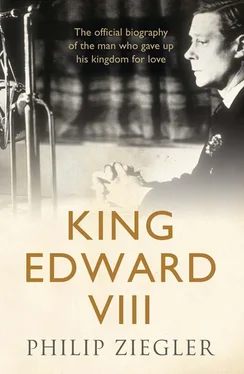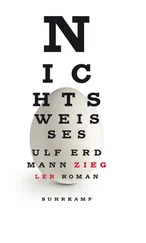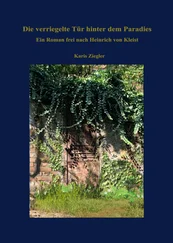The King was not convinced that his son’s apparition would thus magically still the tempest, but he felt that at least it would be a useful stage in the education of a future monarch. Canada had asked first for a visit from the Prince, so Canada would start the series, the other Dominions and parts of the Empire would follow in the next few years. It was a prospect that exhilarated and alarmed the Prince. He longed to travel, but though he had no concept yet of how gruelling his tours would be, he knew well that they would be no joy ride. He would be constantly on parade, scrutinized in every detail of his behaviour, blamed if he were too solemn or too frivolous, criticized for his formality, rebuked for his informality. ‘Your visits to the Dominions will be made or marred according as you do and say the right thing,’ Lord Stamfordham sternly warned him. ‘The Throne is the pivot upon which the Empire will more than ever hinge. Its strength and stability will depend entirely on its occupant.’ 34The Prince found it troublesome enough always to do and say the right thing in the restricted periods during which he was on duty in the United Kingdom; to have to do so for months at a time under the microscope that is trained upon a royal visitor would test him unreasonably hard. It was with grave qualms that he sailed from Portsmouth on 5 August 1919, on his way to the New World.
THE PRINCE’S HAPPINESS, ALMOST HIS SURVIVAL, ON HIS gargantuan tours depended as much as anything on the people who accompanied him. For the trip to Canada Stamfordham recommended a man who, like Thomas and Legh, was to serve him until his reign was over. Admiral Halsey – ‘the Old Salt’ as he was derisively but affectionately nicknamed – was something of a Hansell; sound, honourable, humourless, unimaginative. He was ‘the ideal Chief of Staff’, the Prince told his mother, ‘and I know we are going to be a very happy family’. Needless to say they were not; friction in such a party was almost inevitable, and became completely so when Halsey was matched by a political adviser with unspecified responsibilities, the energetic and somewhat impatient Edward Grigg. Grigg, by family background as well as predilection, was destined to devote the greater part of his life to the service of the British Empire. He was ‘a very exceptional man’, the Prince went on, ‘so clever and able and he has such splendidly broad-minded and far seeing ideas, a great imperialist …’ 1He was all that, but also assertive, suffered fools badly, and considered Halsey something of a fool. The prospects for harmony were not bright.
In a memorandum which Grigg prepared for the Colonial Secretary, Milner, he observed that the main object of the Prince’s visit was ‘to create an atmosphere. He will do this largely by natural tact and charm.’ But he would have to overcome the feeling in North America that the monarchy was no more than an ‘interesting feudal anachronism’. His speeches should emphasize his ‘appreciation of the political institutions of the Empire and of the very vital place which the Crown takes as the nodus of the whole web. That line is, I think, good for the Canadian as well as the American market.’ Lloyd George minuted dubiously: ‘There must be nothing that would look in USA like a challenge to republican institutions’; an indication of the many tightropes the Prince was going to be required to walk over the next few years as he teetered between America and Canada; Westminster and Dominion governments; federal capital and state capitals; French Canadian and Anglo-Canadian; Boer and rooinek . 2
When he left Portsmouth, however, the Prince was looking not forward to such problems but backward towards Mrs Dudley Ward. At one point he had tried to persuade her to accompany him to Canada, or at least to meet him there. She had taken the possibility seriously enough to consult Piers Legh’s fiancée about it, but had wisely decided to stay behind. 3The Prince was disconsolate and only began to regain his spirits when the battle cruiser, HMS Renown , arrived at St John’s and the demands of the tour left less time for brooding.
‘No enthusiastic mob – seems a dead place on the whole,’ commented Sub-Lieutenant Hutchinson gloomily. ‘Went ashore, but the only thing they seem to sell here is ice-cream.’ 4He failed to note the Prince’s favourite feature of his arrival, the triumphal arch composed largely of drums of cod-liver oil and festooned with the carcasses of dried codfish. 5Nor was the Prince disturbed by the relatively meagre crowds, proudly describing his ‘rapturous reception’ to the King: ‘The fact that my first day in the Dominion was a success has given me confidence for the future.’ 6What gave him greatest confidence was that he was performing well in public. Godfrey Thomas, who was also in the party, told the Queen, ‘I cannot describe … how well the Prince is speaking.’ The Canadian Prime Minister, Sir Robert Bordern, had been ‘immensely struck and talked of nothing else after the St John visit’. 7
The Prince was less struck by Sir Robert Bordern. ‘Quite pleasant, but rather a dull old stick,’ he described him to the Queen. 8Sometimes the Prime Minister was worse than that. When the Prince was about to make the most important speech of his Canadian visit, Bordern noted that he was nervous and distrait: ‘I endeavoured to divert his attention by recounting some amusing anecdotes, but he quite frequently consulted his notes.’ In spite of his no doubt well-intentioned sabotage, the speech, Bordern concluded, was ‘admirable in every way’. 9
The Prince’s next important stop, Quebec, introduced him to what he had been told would prove the greatest impediment to a successful tour, the hostility between anglophone and francophone Canada. Expecting the worst, he was pleasantly surprised. ‘They are a curious people and very touchy, but they seemed quite pleased and certainly gave me a good welcome,’ he wrote of the French Canadians to the King. 10
In Montreal, speaking half in French and half in English, he claimed that the union of the two races was more than a matter of political convenience, ‘it was, and will always remain, an example of the highest political wisdom’. 11The French Canadians, an anonymous lady assured the King, likened the Prince to ‘ L’Enfant Jésus ’. 12One may doubt whether many French Canadians spotted the similarity but the Prince went down well with a public disposed to be critical and captious.
It was Toronto which offered the most turbulent welcome. The Prince’s stay there, Thomas told the Queen, ‘were the most extraordinary days I have ever seen’. Things began relatively quietly, enthusiasm mounted by the hour, and the scenes when he drove through the city on his final day made Thomas think ‘that half the people had taken leave of their senses’. 13To the Prince it was overwhelming. For the first time he tasted the heady, dangerous wine of mass adulation. ‘The most wonderful days of my life,’ he described them, ‘… amazingly marvellous. People seemed to go quite mad.’ 14An unidentified lady in Toronto wrote to a friend in England and at third hand her letter came to the Queen. ‘He has won all hearts, and the demonstration here was personal love for him,’ wrote the lady. She had been to hear him speak: ‘He was very boyishly shy and very pink, but the dearest, sweetest and most bewitching creature. He really looked as if he were going to cry and bit his lip, but imagine, he faced a crowd of 50,000 people, who rose of course and yelled and screamed and cheered, never was there such a greeting. He spoke beautifully and to the point and looked sweet, his lovely complexion and blue eyes are the admiration of everyone.’ 15
Читать дальше












